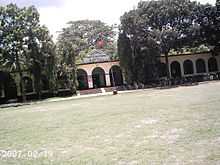Nawabganj District
| Chapai Nawabganj চাঁপাই নবাবগঞ্জ | |
|---|---|
| District | |
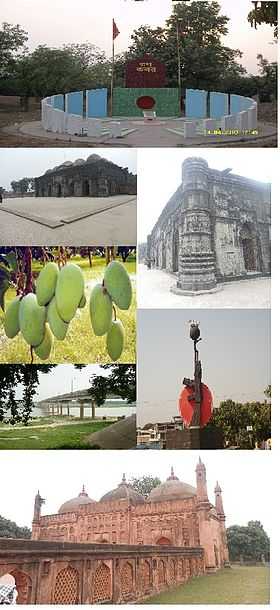 | |
 Chapai Nawabganj | |
| Coordinates: 24°44′N 88°12′E / 24.73°N 88.20°ECoordinates: 24°44′N 88°12′E / 24.73°N 88.20°E | |
| Country |
|
| Division | Rajshahi Division |
| Area[1] | |
| • Total | 1,702.55 km2 (657.36 sq mi) |
| Population (2011) | |
| • Total | 16,47,521 |
| • Density | 970/km2 (2,500/sq mi) |
| Literacy rate | |
| • Total | 42.09% |
| Time zone | BST (UTC+6) |
| • Summer (DST) | BDST (UTC+7) |
| Postal code | 6300 |
| Website | Banglapedia Article |
Chapai Nawabganj (চাঁপাই নবাবগঞ্জ)[2] is a district in Northern Bangladesh. It is a part of the Rajshahi Division. Originally it was a subdivision under Malda district. In 1947, this was severed from Malda and was given to East Pakistan as a sub-division of Rajshahi district. Eventually,it became a separate district of Bangladesh in 1984.[3] The north and west part of Chapai Nawabganj is bounded by Malda and Nadia of India, east is by Naogaon and south-east is by Rajshahi district.
Geography
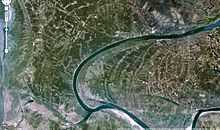
Demographics
According to 2011 census report,[5] Chapai Nawabganj had a population of 16,47,521.[5] Among them, 8,10,218 are male and 8,37,303 are female. More than 3,10,000 lives in urban area and 968 people lives per km2.. The growth rate is 1.44 which is bellow the average rate in Bangladesh.
History
Chapai Nawabganj was one of the sub-divisions of the former Rajshahi zilla. Chapai Nawabganj was part of ancient gaur capital. It is said that this area had strategic and commercial importance due to its location at the junction of the rivers Mahananda and the Ganges. Because of its importance, Alivardi Khan founded Nowabganj town which in course of time known as Nawabganj.Until 1947, Nawabganj was a thana under Malda district, India.
The gateway of North Bengal, Malda was once the capital of Gour-Banga, with 3456 km² of land classified as Tal, Diara, and Barind. Malda awaits the advent of tourists and people of archaeological interest with its wealth to be enjoyed and its huge potential to be explored.
This portion of the earth is washed by the waves of the rivers Ganges, Mahananda, Fulahar, and Kalindri. It has witnessed different empires which were raised, flourished, and then cast down near oblivion by a successor kingdom built up on the relics of its predecessor. Panini mentioned a city named Gourpura, which by strong reason may be identified as the city of Gouda, ruins of which are situated in this district. Examples are legion of the relic of a predecessor kingdom being used in the monuments of the successor kingdoms.It had been within the limits of ancient ‘Gaur’ and ‘Pandua’ (Pundrabardhana).
These two cities had been the capital of Bengal in ancient and medieval ages .The boundary of Gour was changed in different ages since 5th century BC. Its name can be found in Puranic texts. Pundranagar was the provincial capital of Maurya Empire.Gour and Pundrabardhana formed parts of the Mourya empire as is evinced from the inscriptions, Brahmilipi on a seal discovered from the ruins of Mahasthangarh in the Bogura District of Bangladesh. Hiuen Tsang saw many Ashokan stupas at Pundrabardhana.The inscriptions discovered in the district of undivided Dinajpur and other parts of North Bengal along with the Allahabad pillar inscriptions of Samudragupta clearly indicate that the whole of North Bengal as far east as Kamrup formed a part of the Gupta empire.After the Guptas in the early 7th century AD, king Sasanka of Karnasubarna as well as the king of Gaur ruled independently for more than three decades. From the middle of 8th century to the end of 11th century, the Pala Empire ruled Bengal and the kings were devoted to Buddhism. It was during their reign that the Jagadalla Vihara (monastery) in Barindri flourished paralleling with Nalanda, Vikramshila, and Devikot.The Pala Dynasty yielded to the emergence of Sena Empire. The Sen rulers were Hindus and in the habit of moving from place to place within their kingdom. At the time of Lakshman Sen Gour was known as Lakshmanabati. The Sen kings ruled Bengal till Bakhtiyar Khilji conquered Bengal in 1204 AD.Thereafter the Muslim rule lasted for about five hundred years. Sirajuddaulah was defeated by Lord Clive at the battle of Plassey in 1757, which marked the beginning of British rule. From ancient times, rulers of various origins, religions, and dynasties left imprints of their times on the earth in this district. Those who left ruins and relics speak of past pomp and grandeur, and hold interest for archaeologists and tourists.
This district, Malda, formed in 1813 out of the outlying areas of Purnia, Dinajpur, and Rajshahi districts. At the time of Dr. B. Hamilton (1808–09), the presents thanas of Gazole, Malda, Bamongola, and part of Habibpur were included in the district of Dinajpur and the thanas of Harischandrapur, Kharba, Ratua, Manikchak, and Kaliachak were included in the district of Purnia. In 1813, in consequence of the prevalence of serious crimes in the Kaliachak and Sahebganj thanas and also on the rivers, a joint magistrate and deputy collector were appointed at English Bazar with jurisdiction over a number of police stations centered around that place and taken from the two district. Thus the district of Malda was born.
The year 1832 saw the establishment of a separate treasury, and in 1859 a full-fledged magistrate and collector was posted.Up to 1876 this district formed part of Rajshahi Division, and from 1876 to 1905 it formed part of Bhagalpur Division. In 1905, it was again transferred to Rajshahi Division, and until 1947 Malda remained in this division. In August 1947 this district was affected by the Partition of India. Between August 12 to 15, 1947 whether the district would become part of India or Pakistan was unknown, as the announcement of the Radcliffe Line did not make this point clear. During these few days the district was under a magistrate of East Pakistan until the details of the Radcliffe award were published and the district became part of West Bengal on the 17th of August 1947.↵Five thanas were given to Pakistan under the district of Rajshahi which later formed as Chapai Nawabganj.
Climate
Chapai Nawabganj is very close to the big city Rajshahi and the climate of both districts are very close.Under Köppen climate classification, Rajshahi has a tropical wet and dry climate. The climate of Rajshahi is generally marked with monsoons, high temperature, considerable humidity and moderate rainfall. The hot season commences early in March and continues till the middle of July. The maximum mean temperature observed is about 32 to 36 °C (90 to 97 °F) during the months of April, May, June and July and the minimum temperature recorded in January is about 7 to 16 °C (45 to 61 °F). The highest rainfall is observed during the months of monsoon. The annual rainfall in the district is about 1,448 millimetres (57.0 in).[6]
| Climate in Chapai Nawabganj | |||||||||||||
|---|---|---|---|---|---|---|---|---|---|---|---|---|---|
| Month | Jan | Feb | Mar | Apr | May | Jun | Jul | Aug | Sep | Oct | Nov | Dec | |
| Average Temperature (°C) | 18° | 20° | 25° | 30° | 36° | 35° | 35° | 38° | 36° | 30° | 25° | 16° | |
| Average Precipitation (cm) | 1.6 | 1.0 | 2.9 | 2.9 | 11.1 | 24.4 | 36.1 | 25.4 | 21.2 | 11.4 | 1.4 | 0.1 | |
| Source: WeatherBase.Com|[National news papers] | |||||||||||||
Civil administration
Chapai Nawabganj district comprises four thanas or upazilla which are Bholahat Upazila,(ভোলাহাট উপজেলা), Gomastapur Upazila (গোমস্তাপুর উপজেলা), Nachole Upazila (নাচোল উপজেলা), Nawabganj Sadar Upazila(নবাবগঞ্জ উপজেলা) and Shibganj Upazila,(শিবগঞ্জ উপজেলা). There are three municipalities which are Nawabganj Sadar,(নবাবগঞ্জ সদর), Shibganj (শিবগঞ্জ) and Rohanpur (রহনপুর).
Administration
Administrator of Zila Porishod: Moulana Abdul Matin[7]
Deputy Commissioner (DC): Dr Shah Alam[8]
Transportation
This district is the most western district in Bangladesh which has boundary with the neighboring country India. And for importing and exporting, there is a land port in this district which makes this district an important route for communicating with the neighboring country. And the construction of the Jamuna Bridge at Sirajganj also makes its transportation system an important one all over the country. That is why highways were constructed over the district. The major transport systems inside the town is the bike, rickshaws, bi-cycle and CNG rickshaws.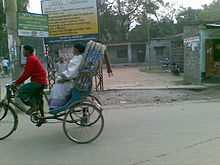
Bus
The major transportation system in this town is the bus service to different districts and towns. The main transportation route is Nawabganj-Rajshahi. The bus transportation service is off three types which are gate-lock, direct and local service. The others bus routes are Nawabganj-Shibganj, Nawabganj-Naogaon, Nawabganj-Nachol, Nawabganj-Rohanpur. The BRTC bus service serves for the long intra-district route to almost all important districts of Bangladesh. The most important long route is the Nawabganj-Dhaka. There are lots of bus services on this route. There are two bus stopages. The biggest one is called Chapai Nawabganj Bus Terminal and the other is the Dhaka Bus Terminal.Sona Mosjid-Rajshahi-Sona Mosjid bus Service are on at7.15am to 5.15pm every 1 hour after.
Railway
There are limited railway services with Rohanpur and Rajshahi. One of the international rail line passes through the district to Malda, West Bengal, India. There are few services of local train from different stations of Chapai Nawabganj such as Nawabganj Sadar, Amnura, Nachole, Nijampur, Rahanpur to Rajshahi and other parts of Bangladesh and also has a shuttle service from Nawabganj to Rajshahi for the intercity train service from Rajshahi to other part of Bangladesh.
Waterway
In the past, the main transport system was based on the water path. The river Padma (Ganges), Mahananda River, Pagla, Moraganga and some beels (marshland) were used for intra-transport system. The water level went down due to adverse effect of Farakka Barrage on Padma (Ganges) river, and therefore, water transport has lost its popularity. But still rivers are used for transportation of daily goods from different parts of the district. Still the transportation from the villages in western and eastern parts of the district depends on the boat. In the Shibgonj Upozila have a small river name[ pagla]
Economy
This district is mainly a plain land with rivers. The whole district is full of fertile land with proper irrigation facilities. That's why the economy is totally dependent on the agriculture. But as there are a number of rivers flows by this district, lots of people depends on the river like fishing and some business related to the rivers.
Mango
Chapai Nawabganj is called the capital of mango in Bangladesh. The main product which mainly accelerates the economy of this district is the mango. Lots of mangoes are produced in summer each year. Most of the land of this district is full of mango orchards where various kinds of mango are produced. The economy is surrounded by the production of the mango in this district. The main part of mango production is the Shibganj, Bholahat and Gamostapur upozilla. "Fozli Mango Pack" named a mango providing company is working for its tourism opportunity and its mango future.
Culture
Gombhira gaan
Gombhira gaan is one kind of folk song popular in this district and as well as the northeaster part of Bangladesh.It is assumed that gombhira gaan was originated from the worship of the god SHIVA (one of the god of Hindu religion), who was also known as 'Gombhir'. This type of song was used only in Puja (worship) in past time. Most of the Hindu community celebrated the puja of Dharma Thakur (a popular god of Hindus) on the last day of the Bengali year which was known as GAJAN of shiva in medieval era. At that time, it was imagined that SHIVA was present at the performance. Initially, Gombhira was of two kinds; the primary Gombhira in which god and goddess were addressed and human joys and sorrows were described and sometimes important events of the year were described. In secondary Gombhira also called narrative Gombhira, every character would represent a social problem. Gombhira songs originated among the Hindu community of Maldah in West Bengal. After the creation of Pakistan, Chapai Nawabganj was severed to Rajshahi District and became the main center of Gombhira songs, which underwent major changes in theme and mode of presentation. Muslims became the custodians of this song and made it integral part of their social life and there culture.[9]
Nowadays, Gambhira reflects contemporary social problems through witty dialogue, songs, dances and jokes. This is the main part in any cultural celebration in this district with great entertainment and explanation of social problems.
Local Language
The people of chapai nawabganj use the bangla language but have their own dialect which has lots of words that are different than the standard bangla language. Some of the common words used here are like অ্যাইগন্যা = উঠান (yard) আইলস্যা = অলস (Lazy) আইলশ্যা/কাড়ি = ধানের খড় (Stick of paddy) ইন্দারা/কুমহা = কুয়া (Draw-well) উফাদ্দিক = অকর্মন্য (Idle) উসকাঠী = রান্নার কাজে ব্যবহারিত একটি দন্ড যা দ্বারা জ্বালানী চুলার মধ্যে পাঠানো হয় (Stick that are used to help stoke into stove ) * কানটা = বাড়ির পিছনের জায়গা ( Back space of a house ) গৈইড়্যা = ছোট ডোবা ( Pool ) *ভূইশ = মহিষ ( Buffalo) বল/আইড়্যা = ষাঁড় ( Ox ) বকরী = ছাগল (Goat) পাঘা = দড়ি ( Cord ) লাহি = নাভী (Belly-button) ঘুটা/নোন্দা = গরুর গোবর দিয়ে তৈরি এক প্রকার জ্বালানি (A stick with cow-duns for producing fire ) তহোমন = লুঙ্গী () সাঠা = এক ধরনের লাঠি ( One kind of stick ) পিরহাইন = পোষাক ( Dress ) ছুড়ি = কুমারী মেয়ে ( Girl ) ঘাঁটা = রাস্তা ( Path ) গাটঠা/ বেহুদ্দা= বদমাইশ ( Wicked ) ড্যারমা/মোটাহুস/হুসমোটা = কান্ডঞ্জানহীন ব্যক্তি ( Nonsense ) নাথ = গরুর নাখের ভিতর ফুটো করে দড়ি হিসাবে যেটা দেয়া হয় ( A cord that is used at cow nose) গোলদান = গরুর গলায় যে দড়ি পরানো থাকে ( A cord that is used at cow neck ) ছাইনচ্যা = টিনের চালা বেয়ে যেখানে পানি পড়ে ( A place Where the rain fall from the thatching) সলহি = গরুর গাড়ির জোয়ালের দুই ফুটোর মধ্যে দেয়ার জন্য কাঠের লম্বা দন্ড (Stick that is used to cow carriage ) ডুঁইড়া = খোজ করা (Find) হাইস্যাল = রান্নাঘর (Kitchen) সানকি = রান্না ঘরে ব্যবহারিত মাটির পাত্র ( A pot of mud ) ছেঁচকি = তরকারী নাড়ার জন্য ব্যবহারিত লোহার দন্ড. ( A stick of iron for household purpose ) ডাকুন = ঢাকনা ( Cover of mud) ডই = ডাল নাড়ার জন্য কাঠের দন্ড( A stick of wood for household purpose ) হাইস্যা = হাসুয়া ( A kind of necklace) পাইহ্যা = চাকা (Wheel) লদদ্দি = নদী (River) পইখর = পুকুর (Pond) গোহিল = গোয়াল (Cowshed) আইল = জমির কিনারা ( The edge of the land ) হ্যালা = সাঁতার কাটা (Swimming) কোচ্ছুল = চামচ (Spoon) লেহেলি = লেপ (A quilt stuffed with cotton used as a wrap during sleeping in winter) পহাত = সকাল (Morning) কান্ধা = কিনারা ( Edge ) আড়া/আইল = জমির সীমানা ( Boundary of land) জাফত = দওয়াত ( Invitation) ন্যাংটা= উলঙ্গ(naked) টাপানো= দৌড়ানো (run)
Religion
The district of Nawabganj consists 1987 mosques, 474 temples, 56 Buddhist temples and 28 churches. Chotto Sona Mosque, Chapai Mosque, 15th century Darashbari mosque, etc. are famous mosques. Jora Math is the famous Buddhist monastery and Naoda Stupa is the Buddhist monument.
Places of interest
Choto Sona Mosque
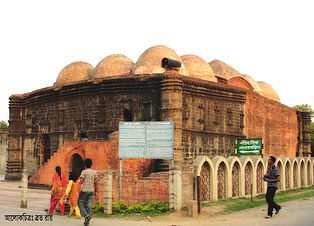
One of the most graceful monument of the Sultanate period is the Chhota Sona Masjid or Sona Mosque at Gaur in Chapainawabganj Built by one Wali Muhammad during the reign of Sultan Alauddin Husain Shah (1493–1519). Originally it was roofed over with 15 gold-gilded domes including the 3 Chauchala domes in the middle row, from which it derives its curious name.
Educational institutions
This is a small District in Bangladesh with some good educational institutions.
Schools
District Name == Thana Name ==Institute Name === EIIN
Nawabganj = Gomastapur = Tojammel Hosen Pre- Cadet School
Nawabganj = Bholahat = Jambaria Junior Girls School - 124321
Nawabganj = Bholahat = K. H. A. Junior School - 131002
Nawabganj = Bholahat = Sikari Junior Model Girl'S School - 130991
Nawabganj = Bholahat = Adatala High School - 124334
Nawabganj = Bholahat = Bachchamari Hgh School - 124330
Nawabganj = Bholahat = Bargachhi High School - 124327
Nawabganj = Bholahat = Baroy Para High School - 124335
Nawabganj = Bholahat = Bholahat Rameshwar Pilot Institution - 124322
Nawabganj = Bholahat = Bireswarpur Girls High School - 124332
Nawabganj = Bholahat = Bojratek Sobja Pilot High School - 124326
Nawabganj = Bholahat = Char Dharampur High School - 124336
Nawabganj = Bholahat = Daldali High School - 124328
Nawabganj = Bholahat = Fotepur High School - 124331
Nawabganj = Bholahat = Gohal Bari High School - 124320
Nawabganj = Bholahat = Khale Alompur High School - 124333
Nawabganj = Bholahat = Manjur Ahmed High School - 124329
Nawabganj = Bholahat = Mushribhuja Yusuf Ali High School - 124325
Nawabganj = Bholahat = Nekjan Girls High School - 124323
Nawabganj = Bholahat = Polladanga Din Mohannad High School - 124324
Nawabganj Bholahat Shibgonj Girls High School 124615
Nawabganj Bholahat Alalpur Darus Sunnat Dakhil Madrasha 124341
Nawabganj Bholahat Jambaria Darussunnat Nesaria Dakhil Madrasah 124340
Nawabganj Bholahat Jhowbona Mohila Islami Academy 131497
Nawabganj = Gomastapur = Bosnail Junior Girl'S School - 130971
Nawabganj Gomastapur Bosonitala Girls High School 124685
Nawabganj Gomastapur Prabatipur Ideal Junior Girl'S School 130977
Nawabganj Gomastapur Puratun Prosad Pur Adorso Girls Junior School 124390
Nawabganj Gomastapur Rohanpur Hazi Gaziuddin Jr. Girls School 124353
Nawabganj Gomastapur Shoro Gram Junior Girl'S School 124391
Nawabganj Gomastapur Alinagar Girls High School 124378
Nawabganj Gomastapur Baradadapur K.A.M.. High School 124360
Nawabganj Gomastapur Basanitola High School 124363
Nawabganj Gomastapur Begunbari B.I.B Girls High School 124678
Nawabganj Gomastapur Bhat Khair High School 124365
Nawabganj Gomastapur Boalia Girls High School 124381
Nawabganj Gomastapur Boalia High School 124358
Nawabganj Gomastapur Bohipara High School 124675
Nawabganj Gomastapur Bongpur High School 124382
Nawabganj Gomastapur Brozonathpur School 124379
Nawabganj Gomastapur Charadanga High Boys Academy 124377
Nawabganj Gomastapur Cheradanga Girls High School 124372
Nawabganj Gomastapur Chowdala Bl. High School 124357
Nawabganj Gomastapur Chowdala Girls High School 124383
Nawabganj Gomastapur Deopura High School 124354
Nawabganj Gomastapur Enayetpur High School 124362
Nawabganj Gomastapur Gomastapur A.Hamid Girls H.S. 124366
Nawabganj Gomastapur Gomastapur Girls Academy 124350
Nawabganj Gomastapur Gomastapur Pilot High School 124355
Nawabganj Gomastapur Hogla High School 124384
Nawabganj Gomastapur Huzrapur Model Academy 124385
Nawabganj Gomastapur Joshoil High School 124367
Nawabganj Gomastapur Khayrabad Hazi Sadar Ali High School 124369
Nawabganj Gomastapur Krishnapur High School 124373
Nawabganj Gomastapur Lebudanga High School 124374
Nawabganj Gomastapur Mridhapara High School 124376
Nawabganj Gomastapur Nayadiary Hazi Yakub Ali Mondal High School 124361
Nawabganj Gomastapur Prosadpur Girls High School 124380
Nawabganj Gomastapur Radanagar Girls High School 124375
Nawabganj Gomastapur Radhanagar A.N.C High School 124364
Nawabganj Gomastapur Rahanpur Janata High School 124371
Nawabganj Gomastapur Rohanpur Haji Riaz Uddin Sarker High School 124368
Nawabganj Gomastapur Rohanpur A.B.Gov.High School 124351
Nawabganj Gomastapur Rohanpur Rabeya Girls High School -124352
Nawabganj Gomastapur Rokunpur High School 124356
Nawabganj Gomastapur Sonabar High School 124359
Nawabganj Gomastapur Sontoshpur Girls High School 124370
Nawabganj Gomastapur Alinagar Darul Ulum Dakhil Madrasha 124398
Nawabganj Gomastapur Bangabari Dakhil Madrasha 124403
Nawabganj Gomastapur Begum Nagor Mohila Dakhil Madrasha 124409
Nawabganj Gomastapur Bibison Dakhil Madrasah 124405 Nawabganj Gomastapur Boalia Boirtola Dakhil Madrasah 124413
Nawabganj Gomastapur Brojnathpur Dakhil Madrasah 124415
Nawabganj Gomastapur Chhoto Dadpur Dakhil Madrasah 124411
Nawabganj Gomastapur Chowdala Dakhil Madrasa 124400
Nawabganj Gomastapur Enayetpur Islamia Dakhil Madrasha 124402
Nawabganj Gomastapur Gopinathpur D.S. Dakhil Madrasah 124408
Nawabganj Gomastapur Islampur Gonj Dakhil Madrasah 124393
Nawabganj Gomastapur Jogibari Dakhil Madrasha 124399
Nawabganj Gomastapur Kayempur Al Haj Nurjahan Madrasha 124404
Nawabganj Gomastapur Nandal Al Pur Darus Sunnat Dakhil Madrasa 124401
Nawabganj Gomastapur Nimtala Kathal Dawatul Islam Dakhil Madrasah 124412
Nawabganj Gomastapur Norosia Lal Gar Dakhil Madrasha 124407
Nawabganj Gomastapur Ozogora Baitul Hikma Mohila Dakhil Madrasha 124414
Nawabganj Gomastapur Pirpur Dakhil Madrasah 124410
Nawabganj Gomastapur Rohanpur Dakhil Madrasah 124416
Nawabganj Gomastapur Saheb Gram D.U.J.B.Mohila Dakhil Madrasa 124406
Nawabganj Gomastapur Gomastapur Dblugram Alim Madrasha 124394
Nawabganj Gomastapur Kashia Bari Alim Madrasah 124397
Nawabganj Gomastapur Kharkadanga Alim Madrasa 124395
Nawabganj Gomastapur Shampur Darussunnah Alim Madrasha 124396
Nawabganj Gomastapur Prosadpur Fazil Degree Madrasah 124392
Nawabganj Gomastapur Chowdala Johur Ahmed Mian College 124423
Nawabganj Gomastapur Parbotipur S. B.(Sonabar) Adarsha College 124422
Nawabganj Gomastapur Radha Nagar Barendra College 124421
Nawabganj Gomastapur Rohanpur P. M. Ideal College 124419
Nawabganj Gomastapur Gomastapur Soleman Mia Degree College 124420
Nawabganj Gomastapur Rohanpur Yusuf Ali College 124418
Nawabganj Gomastapur Rohonpur Mohila College 124417
Nawabganj Gomastapur Banga Bari Yunus Smarani School & College 124424
Nawabganj Gomastapur Gomastapur Technical And Business Management College 132915
Nawabganj Gomastapur Rahanpur Technical And Business Management Institute 132428
Nawabganj Gomastapur Rohonpur Punorbhoba Technical & B M College 132755
Nawabganj Nachole Hulashpur Ideal Junior School 124465
Nawabganj Nachole Kasba Uzirpur (Darga) Junior School 124459
Nawabganj Nachole Katlacanthor Junior Girls School 124464
Nawabganj Nachole Khikta Adarsha Junior High School 124454
Nawabganj Nachole Mollaikpur Junior Girls School 124457
Nawabganj Nachole Muslimpur Junior Girls Academy 124427
Nawabganj Nachole Paharpur Junior High School 124452
Colleges
Harimohon Govt. High School
- Nawabganj Government College(নবাবগঞ্জ মহাবিদ্যালয়)Website.
- Nawabganj Government Women's College(নবাবগঞ্জ মহিলা মহাবিদ্যালয়).
- Captain Mohiuddin Jahangir (Birshreshtho) College(ক্যাপ্টেন মহিউদ্দিন জাহাংগীর বীরশ্রেষ্ঠ মহাবিদ্যালয়)
- Shah Neyamotullah College(শাহ নেয়মুতুল্লা মহাবিদ্যালয়)
- Adina Fazlul Haque College (1937) (Shibganj)
- Shibganj Govt. Model High School. (1948)[Shibgonj]
- Shibgonj Girls High school. [Shibgonj]
- Rohanpur Yeasuf Ali College (1967) (Gomostapur)
- Nachoul Degree College (1972)
- Kansat Soleman Degree College (1968)(Shibganj)
- Nawabganj City Collage (1996).
- Shympur Degree College (Shibganj)
- Sonamosjid Degree college(Shibganj)
- Shahbajpur Degree College(Shibganj)
- Chakkirty Degree College(Shibganj)
- Pukuria Women College(Shibganj)
- Binodpur Degree College(Shibganj)
- Krishnogobinda Pur Degree college, Nawabganj (1970).
- Mahipur Degree college (Nawabgonj)
- Mirjapur college (Nachole)
- Harimohon Government High School School Website
- Bholahat Mohbullah College (Bholahat)
- Bholahat College (Bholahat)
- Bholahat Mohila College (Bholahat)
Notable person
Great politician and scholar Idris Ahmed Miah M.L.A was born 13th Sep, 1894 at Dadanchak, Shibgonj and died 9th Oct, 1966. He was buried at Adina College Campus. He is called father of Education in North Bengal. Because he founded Adina College in 1938 and it is the fourth oldest college in North Bengal. He founded many educational institution in his period. He was also the first founder member of Rajshahi University.
- Prof. Shahjahan Mia, Politician and Ex-MP
- Dr. Moinuddin Ahmed MBBS, Politician and EX-MP
- Brigadier Anamul Hoque, Politician, State Minister and MP
- Md. Mizan Uddin, Vice-Canceller, Rajshahi University.
- Mainur Reza Choudhury, Former Chief Justice, Supreme Court Bangladesh.
- MD. Shamser Uddin, Great Teacher and former Head Master, Humayun Reza High School.
- Md. Afser Uddin, Schlar, Great Politician and Social worker.
- Setab Uddin Ahmed, Retire Superintendent PTI.
Habibur Rahman, a Bangladeshi cow trader brutally tortured by Indian Border Security Force (BSF) on 9 December 2011. The video footage of his torture was first aired by an Indian TV channel NDTV and created great uproar in Bangladesh and India.[10]
Dr Jayanti Kumar Ghosh,born at Chapai Nawabganj at a house near old market place (Purano Bazar),former student of HariMohan High School, is a distinguished Doctor in NorthEast England of Great Britain. Now settled in Great Britain and a British citizen. He is also a Fellow of The Royal Society of Medicine of London besides other achievements.
References
- ↑ "Consensus report 2011-Chapai Nawabganj".
- ↑ "Chapai Nawabganj Batayon.".
- ↑ Banglapedia
- ↑ Google Map
- ↑ 5.0 5.1 5.2 Nababganj/Chapai Nawabganj at a glance.pdf "All about Chapai Nawabganj, Bangladesh Bureau of Statistics".
- ↑ "weather report".
- ↑ "The design news-Municipality mayer".
- ↑ "The daily independent news-Deputy commissioners list".
- ↑ Toru (2007-04-23). "Chapai Nawabganj". Banglapedia. Retrieved 2009-11-11.
- ↑
| |||||||||||||||||||||||||
